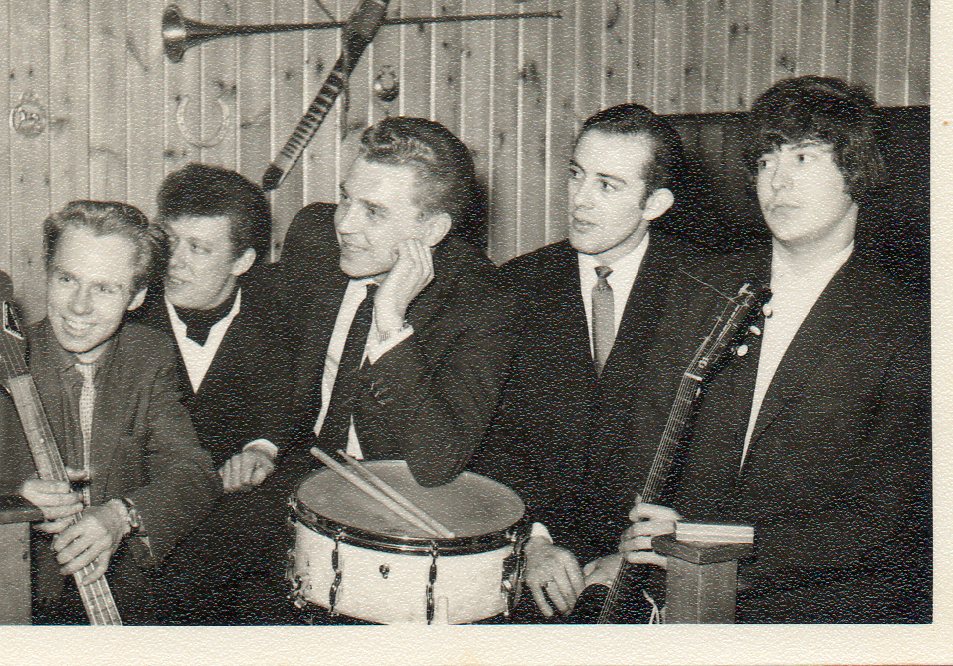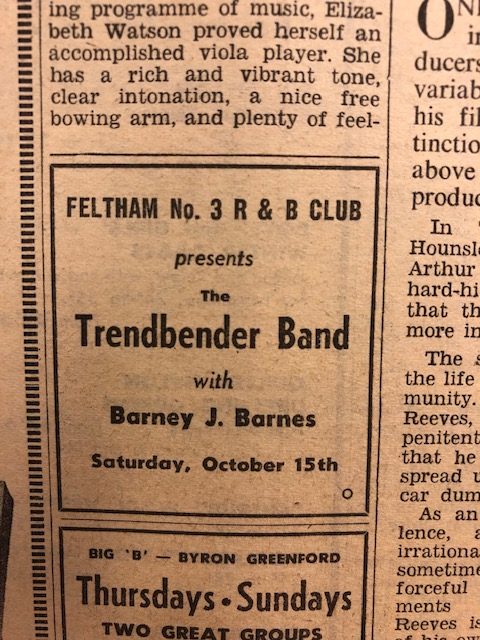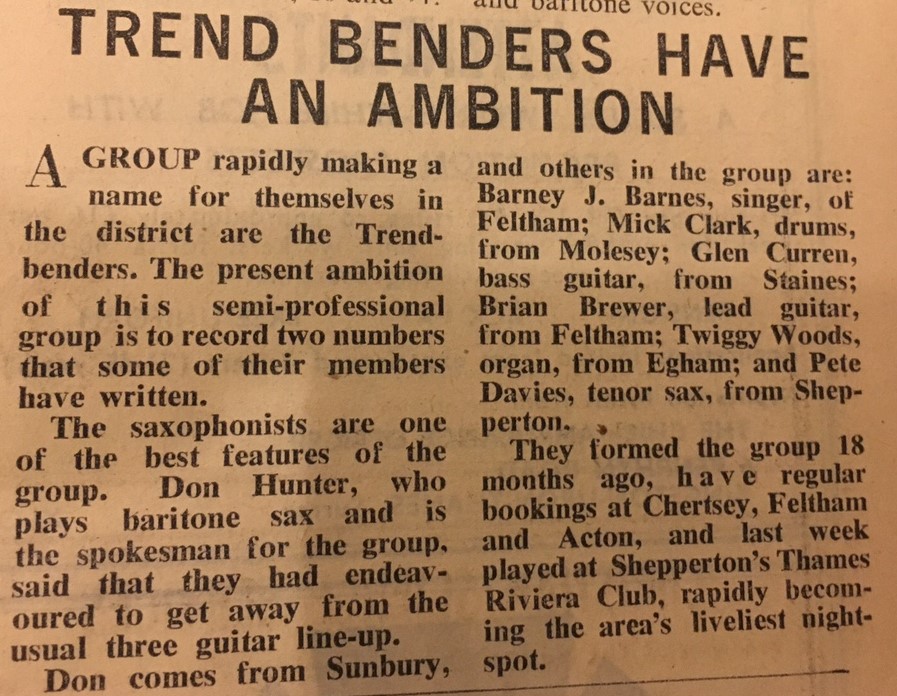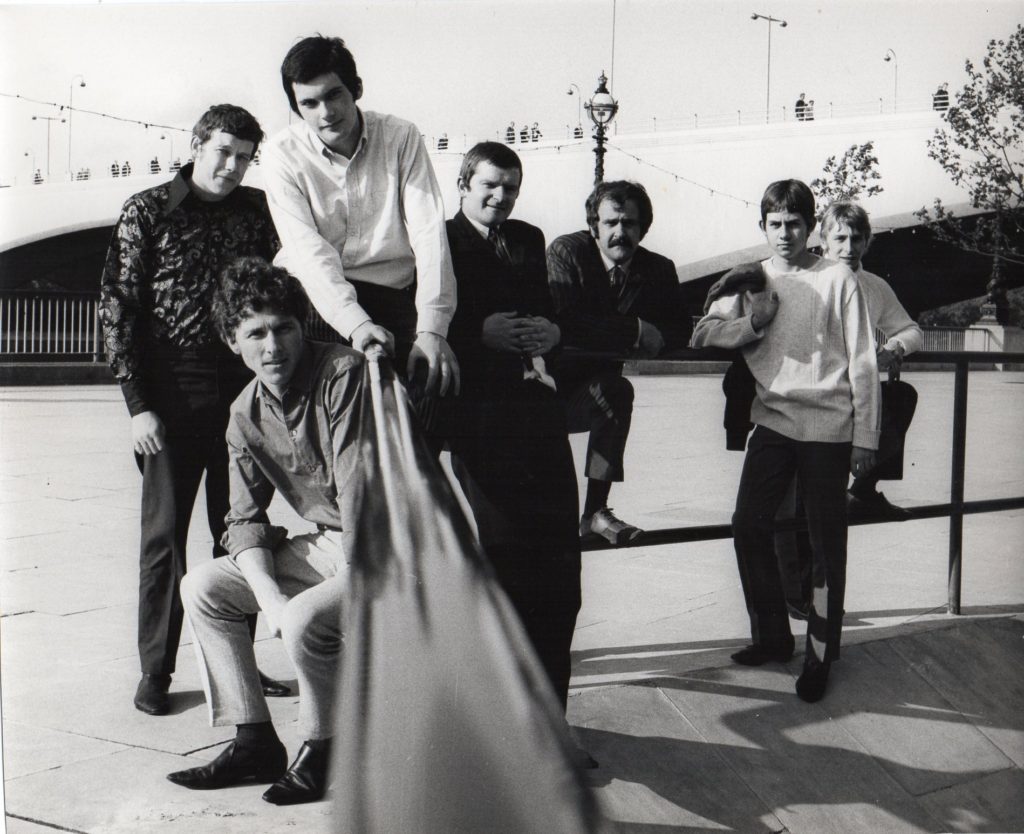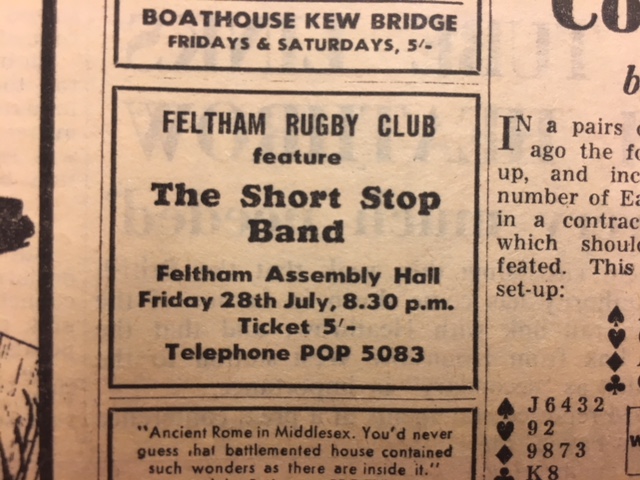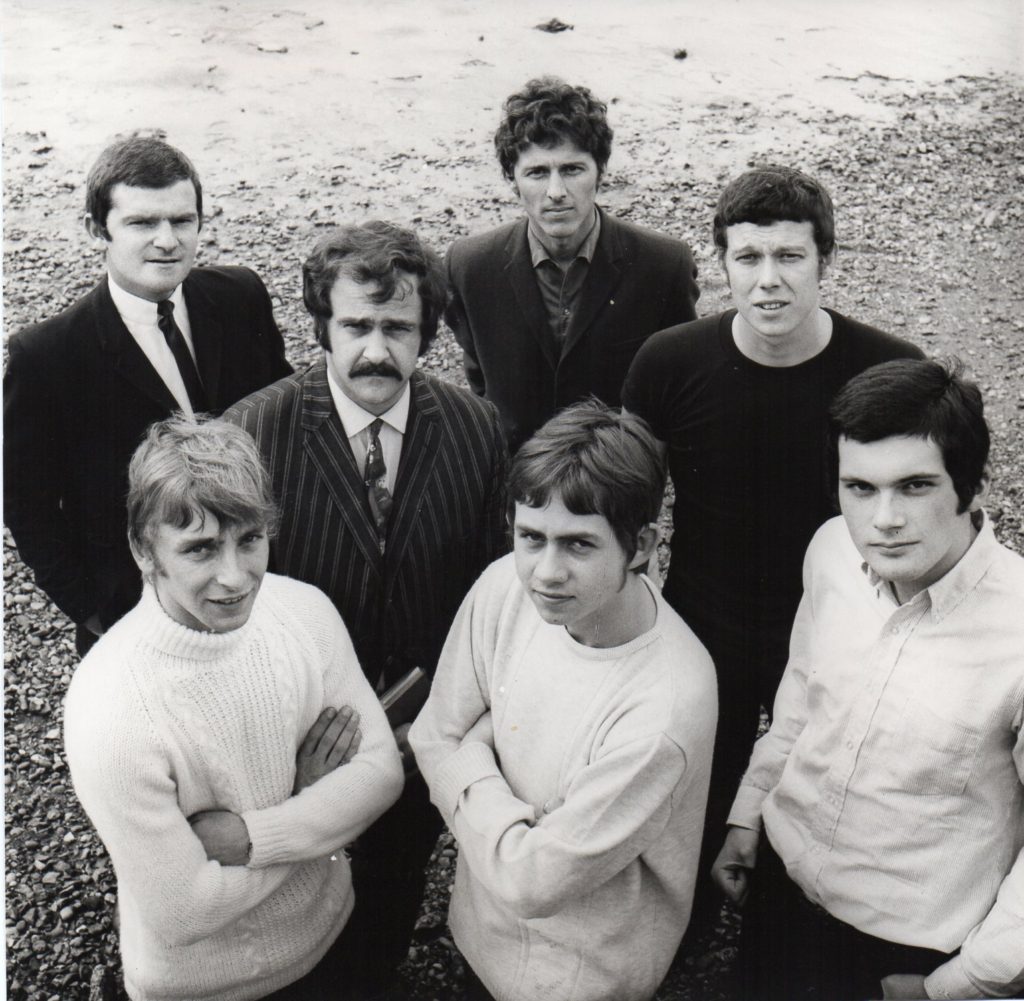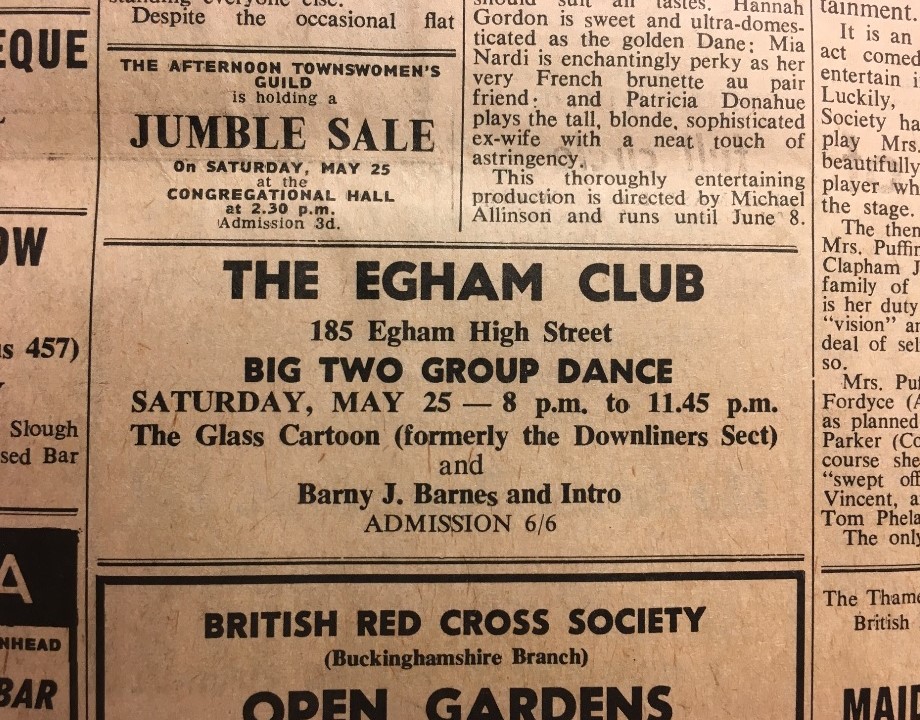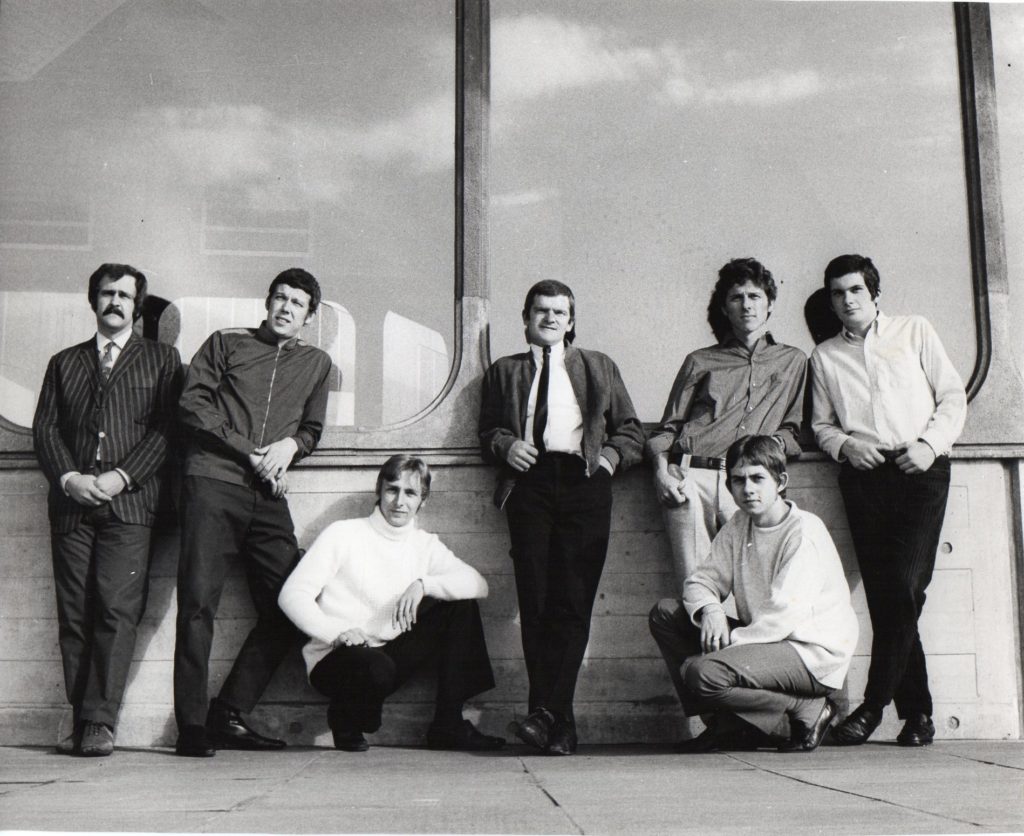By Nick Warburton
Barney J Barnes & The Intro hailed from Feltham in Middlesex (a few miles south from London’s Heathrow Airport) and produced a great northern soul/mod single for Decca in September 1967 entitled “It Must Be Love” c/w “Can’t Stand The Pain”.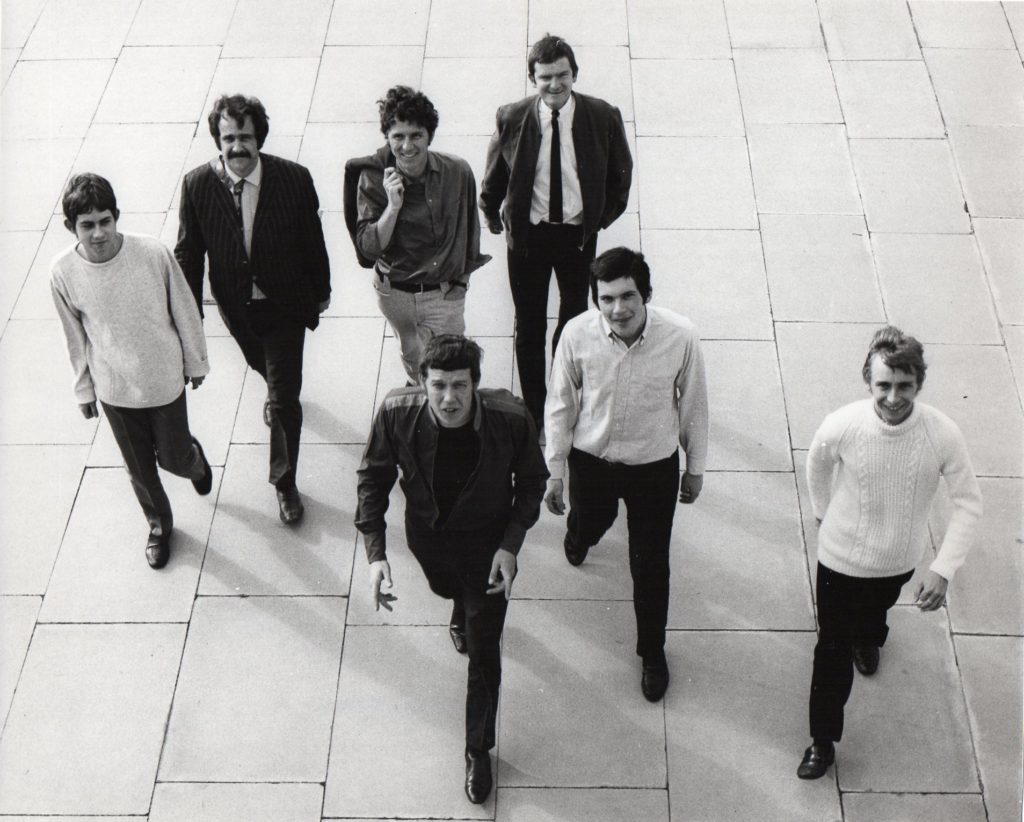
Barney J Barnes and The Intro: Left to right (back row): Peter Wood, Don Hunter, Peter Davies and Frank Hodges. Left to right (front row): Barney J Barnes, Glen Curran and Brian Shepherd (photo from Peter Davies)
Formed as The Trendbender Band around July 1966, the original line-up comprised Peter Wood (Hammond organ); Peter Davies (tenor sax); Don Hunter (baritone sax); Glen Curran (bass); and Mike Clark (drums).
“We did some rehearsals at EMI social club [in Feltham] and that’s how I got involved,” remembers Davies. “Mike Clark was a mate of mind at EMI and wanted to form this band. We then started to pull people in.”
Looking for like-minded musicians to join, Shepperton-based Davies turned to his old youth club friend Don Hunter, who wasn’t playing much and encouraged him to play baritone sax in the fledgling group.
Hammond organist Peter Wood and bass player Glen Curran both hailed from the nearby Staines/Egham area; the latter would be responsible for bringing in future members of the band when it morphed into the Short Stop Band in the summer of 1967. All the musicians needed was a lead guitarist and front man. Cue Barney J Barnes.
“Barney came on the scene quite early,” recalls Davies. “I didn’t know he was with anyone before us. He just turned up on the scene because we’d advertised for somebody and he turned up with ‘Goldy’.”
The “Goldy” in question, short for “Goldfinger”, was guitarist Brian Brewer who together with Barnes would co-wrote “Can’t Stand The Pain”, the future B-side of Barney J Barnes & The Intro’s lone Decca single.
Can’t Stand The Pain (demo)
While Brewer’s background remains a mystery, Barney J Barnes (born June 1941) had quite a pedigree. According to the 9 October 1964 edition of the Middlesex Chronicle (Hounslow Edition), Barnes first started out in the skiffle group The Alleykats but soon progressed on to the original line up of The Valkeries alongside lead guitarist Alan Wakenell; rhythm guitarist Dave Caralambous (a former member of The Smoke-stacks); bass player Dennis Goling (aka Golding); and drummer Ken Fisher.
The Valkeries Mid 1965, left to right: Dennis Golding, Barney Barnes, Ken Fisher, Alan Wakenell, Stuart Heath (photo from Alan Wakenell)
The group’s line up, however, refused to settle and by mid-1965 only Wakenell remained from the first incarnation. While Caralambous would move on to join The Drovers and then Jeff Curtis & The Flames (who morphed into The Kool), Barnes would work with a few other (unknown) local groups before answering Clark’s advert looking for a lead singer. It would prove to be an inspired move.
“Barney was a great raconteur,” remembers Davies. “He had a way of pulling the audience’s leg and they loved him. He was quite a character.”
With the line-up finalised, The Trendbender Band made its debut at the Feltham R&B Club. The Middlesex Chronicle (Hounslow Edition) lists one appearance on 10 September, which may well have been the new band’s first show at the venue, which also put on shows by local rivals Jo Jo Gunne. The Trendbender performed regularly at the club over the coming months and another listing is 15 October.
“Benny Irvine used to run the Feltham R&B club, which was behind the Playhouse,” says Davies. “There was this big hall at the back and he used to run the R&B club. He used to do that quite regularly. Benny was one of what they used to call show boys. He was one of the fairground people. He was a bit of an entrepreneur; a character.”
The Trend, Staines & Egham News, 27 January 1967
According to the Middlesex Chronicle (Hounslow Edition), The Trendbender band line-up remained steady throughout the remainder of 1966 and into the spring of 1967. Somewhere along the way, the musicians recorded two demo tracks under this name: “Stupidity” and “Unchain My Heart”.
Unchain My Heart
Stupidity
Davies recalls that the group also recorded some tracks for Polydor, which might have been these same recordings.
“I know we had a session at Polydor and Mike Clark was on that,” remembers Davies. “I was very friendly with Peter Coe who was with Georgie Fame. Pete was a great mate of mine and we used to play jazz together. He was working for Polydor at the time and got us down to some studio I can’t remember where and we did a recording.”
However, not very long after The Trendbender Band was profiled in the Middlesex Chronicle (Hounslow Edition) in its 14 April 1967 edition, the group briefly changed name to The Short Stop Band.
The change in name was prompted by a number of personnel changes. Gone was the band’s founder Mike Clark and guitarist Brian Brewer, who were replaced by two of Glen Curran’s friends from the Staines/Egham area – guitarist Brian Shepherd and drummer Frank Hodges.
Barney J Barnes and The Intro, Left to right: Barney J Barnes, Peter Davies, Glen Curran, Frank Hodges, Don Hunter, Peter Wood, Brian Shepherd (photo from Peter Davies)
Davies remembers that when Brian Shepherd came on-board, “that’s when we started to make some moves. Brian knew everybody and worked for Radio Luxembourg. We did some demos for Radio Luxembourg at [its studios in] Shepherd’s Market up in town. That’s where the “Can’t Stand The Pain” demo was first made.”
Also around this time (July/August) disc-jockey Dave Cash arranged for the musicians to feature in the BBC Light Programme Monday, Monday. The group performed some tracks on the show but Davies doesn’t recall the titles or the current whereabouts of the recordings.
“We went into the studios in New Bond Street and they did a recording one evening,” he recalls. “We did a couple of numbers and Dave Cash featured us. He was a great mate of Brian Shepherd’s. I never got a copy but Barney did have a copy of that tape.”
Cash also arranged the link-up with a new magazine being launched that September, which prompted yet another name change in the space of a few months.
“They wanted a band to back the new publication,” explains Davies. “They brought this new magazine out and it was called Intro. It was supposed to be this great magazine that the youngsters were going to love and was going to take off. The publishers got involved and started putting money into the band and that’s how we got in the studio doing the recordings with Decca.”
Barney J Barnes and The Intro: Left to right (back row): Frank Hodges and Peter Davies. (middle row): Don Hunter and Barney J Barnes. (front row): Brian Shepherd, Peter Wood and Glen Curran (photo from Peter Davies)
As was common in those days, record labels tended to employ session musicians to lay down the tracks for singles to save on studio time and therefore costs. In the newly named Barney J Barnes & The Intro’s case, the session players were drafted from Ted Heath’s band – Ronnie Verrell, Don Honeywell and Harry Klein.
Unfortunately, although the final takes of “It Must Be Love” and “Can’t Stand The Pain” are impressive enough, they failed to capture the magic of the earlier demos cut as The Short Stop Band; listeners can hear the original “It Must Be Love” featuring the musicians themselves on Cherry Red’s excellent six CD comp Fab Gear.
It Must Be Love (demo)
“We had it like a reggae type thing,” explains Davies. “But Arthur Greenslade who was the musical arranger and director for Decca changed it and sped it all up. He turned it into a rocky sort of thing, which wasn’t what we wanted to do. It was a bit annoying from our point of view because it didn’t sound like us anymore. We weren’t on it, only Barney was.”
It Must Be Love (single release)
Davies continues: “Around this time, ska music was coming through and was very popular. We’d latched on to that. We’d got it sounding a bit like that with the feel.”
Frustrating as the recording turned out, the group was soon rushed into London’s Speakeasy club one evening to mime a scene to “It Must Be Love” for a promotional film by Pathe called Swinging London.
“It was only a short film [for Pathe] and we were playing at the Speakeasy club,” says Davies “They filmed us there. You can see me with a blue shirt. I’m only on for a second because they were really flashing around with Simon Dee in the audience. It’s got our music in the film.”
Although the group didn’t appear on the Decca recordings, they did turn up at the label’s studio on the South Bank for a photo session.
“It was a strange situation,” says Davies. “It was all booked by [the magazine publisher]. When I walked in the studio, the photographer was an old mate of mine called Dave Wesbury from the RAF out in Germany.”
With the single’s release, the Middlesex Chronicle (Hounslow Edition) ran a story on the recently renamed Barney J Barnes & The Intro in its 27 October 1967 edition.
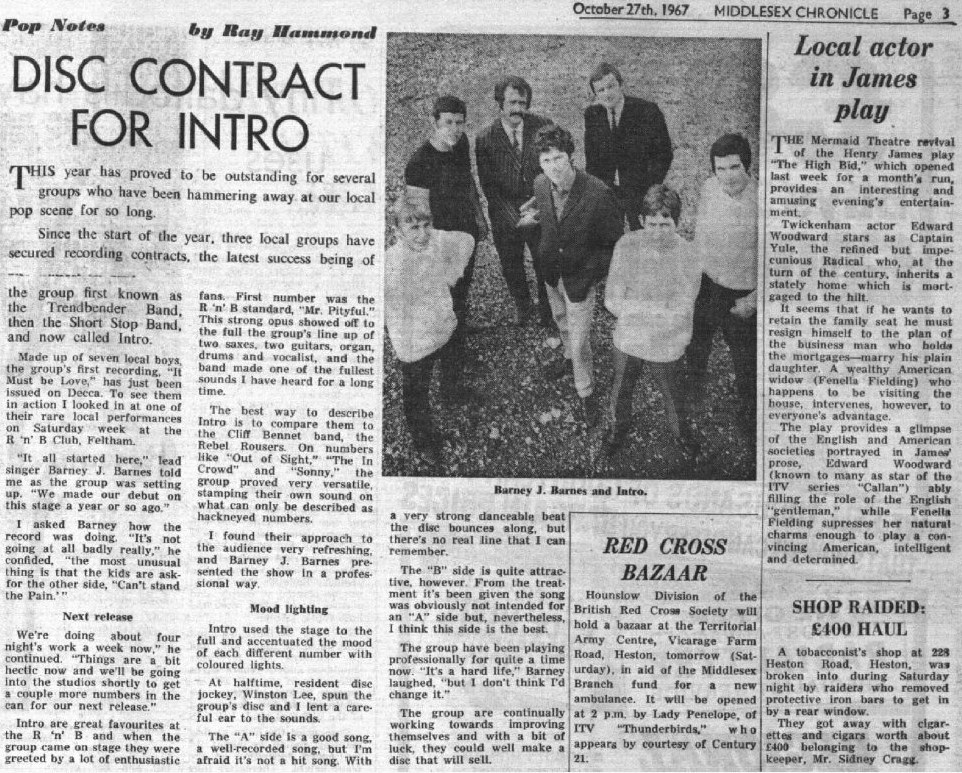
The promotion garnered by the single led to more live more work. Davies remembers playing at Caesar’s Palace in Luton and Billy Walker’s Upper Cut in Forest Gate before it closed that December.
Can’t Stand The Pain (single release)
He also recalls playing Walthamstow Town Hall and Ilford Rugby Club in east London as well as a small club in Acton at the back of the White Hart. The club’s manager was keen to manage Barney J Barnes & The Intro but the musicians declined the offer. Another regular gig in Acton was the Windmere Club in Acton Town Hall.
However, when the Decca single failed to chart, the label dropped the group and the inevitable personnel changes ensued. First out of the door was Hammond organist Peter Wood (nicknamed Twiggy).
Wood would later work with The Sutherland Brothers (just in time for “The Arms of Mary” and Quiver before later becoming part of Pink Floyd’s touring group. Wood later played on Joan Armatrading’s self-titled LP in 1976. That same year, he co-wrote Al Stewart’s Year of the Cat and played on the parent LP. Sadly, the popular keyboard player died while on the road in December 1993, aged 43.
“He died very young in New York,” says Davies. “He was ever such a nice lad. When I heard he’d died so young, about 40, I was quite upset about it.”
Barney J Barnes & The Intro elected to carry on without a replacement but in July 1968, Brian Shepherd departed. The Hounslow, Brentford and Chiswick Post reported Shepherd’s departure in its 19 July issue and noted that it was not long after Peter Wood had left.
It appears that the group was temporarily put on hold as the same newspaper noted in its 29 November 1968 edition that former Magic Roundabout guitarist Ronnie Hunt had joined. Davies remembers Hunt, who hailed from Sunbury-on-Thames and was a mate of Frank Hodges’, taking over from Shepherd but only playing a few gigs before moving on.
As for Shepherd, the guitarist later worked with EMI and discovered singer Sheena Easton. Shepherd later moved to the US and worked for CBS.
Barney J Barnes and The Intro Left to right (standing): Don Hunter, Barney J Barnes, Frank Hodges, Peter Davies and Glen Curran. (kneeling): Brian Shepherd and Peter Wood (photo from Peter Davies)
By early 1969, Barney J Barnes & The Intro had revamped its line-up. Joining Barnes, Davies, Curran and Hodges were new guitarist Richard Walker and baritone sax player Eric Staines, who was later replaced by trumpet player Jeff Sure.
“I was playing guitar in a cabaret backing band at Sunbury-on-Thames ex-servicemen’s club with Frank Hodges,” says Walker.
“He would rave on about how great the band was, and how he’d like to reform it. It was a bit of a precursor to The Blues Brothers, you know, ‘Let’s get the band back together’.”
The new formation continued playing local pubs and clubs around the local area, including Weybridge and Chertsey before gradually becoming more of a social club/function band.
“It carried on until about mid-1975 from memory,” says Walker. “After it split, Frank Hodges emigrated to Australia, and Glen Curran and I started a pub rock band called Smokestack playing around the Slough/High Wycombe area. That continued until 1979 until I moved to Dorset where I still live.”
Little is known about Barnes’s subsequent singing career but an online memorial states that he was fronting a band called Midnight in the mid-1980s. Barney J Barnes died in December 1999.
As for the other surviving members, Davies returned to his jazz background and plays twice a month at the Barley Mow in Shepperton in Middlesex. The sax player doesn’t keep in contact with any of his former band members except Richard Walker. However, he believes that Don Hunter currently resides in Bergerac in France and Frank Hodges is possibly in Barnstaple.
A huge thanks to Peter Davies and Richard Walker for helping with the article, providing the great photos (some of which are credited to Dave Wesbury) and the recordings.
Please contact me at Warchive@aol.com if you can add further information.
